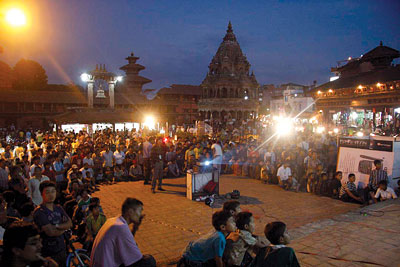 |
Every four years, bars and restaurants and living rooms across Nepal transform themselves into mini-stadia for cheers, screams, oohs and aahs. Even those who shun the merry-go-round of national football leagues find themselves drawn in, and let's not even talk about the real football fans. If anything, this edition of the World Cup has been marked by even more frenzied ululations.
In 1998, I drew on Italian philosopher Umberto Eco to illustrate how the political chatter so beloved of Nepalis was being smothered by sports chatter (Football, politics and public conscience, The Kathmandu Post, July 8, 1998). Back then, recurring parliamentary shootouts attracted their fair share of attention �until the World Cup carnival rolled into town. But what does this sports chatter really signify? Allow me the liberty of retreading my exposition of Eco, who argues that sports chatter fulfils the role of the fake conscience, absolving those who engage in it from any real interest in matters of the state:
"What we experience in the small hours of the morning on our TV sets is by no means simply 'sports'. Sports, in itself, is a healthy waste of energy by an individual, or by people competing against each other. Once this competition is taken up by trained athletes, then the simple act of throwing a stone, or kicking a ball, becomes a spectacle for others to watch, without themselves engaging in it.
So 'sports performance' is sports squared. It does not end here � at one further remove is the discussion of this sport which has been seen, most characterised by the sports press, thus sports cubed. Once we discuss the sports press, and various opinions expressed thereof, we are raising sports to its zenith of power. What we ordinary citizens experience in our readings and impassioned guesstimates, then, is the World Cup at several removes. We are essentially discussing the soccer press, and if FIFA was to recruit actors to run around for 90 minutes for the live broadcasts, a fictitious World Cup could theoretically go on undisrupted.
What this all means, basically, is that for us the World Cup is an abstraction � in much the same way politics is. Despite our genuine interest, our discussions of the World Cup are not really linked to the real action; so this debate shifts to a purely political level. We are as removed from what the Colombian coach had to say to Faustino Asprilla as we are from what KP Bhattarai might have to say to our Prime Minister.
Indeed, the structures of sports chatter and political chatter run so parallel that, as Eco notes, sports chatter becomes 'the parody of political talk...but to such a heightened degree that it becomes itself political speech'. We discuss what happens in the locker rooms and on the field, the machinations of players and coaches, what should have been done by the 'leaders' (the coaches) and the 'MPs' (the players) with all the seriousness and concern that characterises our judgements on the parliamentary antics and backroom betrayals of our netas.
We thus use up the energy available for true, productive debate, and in fact are not even aware that this time has been appropriated. Indulging in sports chatter, we feel we are exercising our intellectual energies, and even contributing to the process of development. Far-fetched? Where, then, have our worries about the Maoist movement, party splits, government stability and even the Humla famine evaporated? Not true, you protest, but it is undeniable that the average human only reserves a certain chunk of his/her waking hours for 'external' events. As it is, the World Cup threatens to take over our hours of repose, and the results are both less ambiguous and more satisfying.
In fact, it is well known that such spectator sports are closer to the soul of the crowd, and can serve as timely diversions. The Roman Emperors put the circuses to good use, a tamasha for the impoverished public.
But do the citizens of Nepal have a political conscience in the first place? Political chatter comes easy to us all, but then so does gossip. Except sports chatter � as a substitute for political chatter � did not really need to pose as a fake conscience. For political chatter in Nepal itself was the imposter all along, a sport in itself, its presence absolving us all of our social consciences."
A PLA Battalion Commander was quoted recently as saying, "Football in so many ways is like politics." It remains to be seen whether sports imitates life or the other way around.
READ ALSO:
Hollow state, Prashant Jha
Spectacle, not speculation, Rabi Thapa
Vacancy, Nepal, Artha Beed
The wages of sin, Publisher's note



